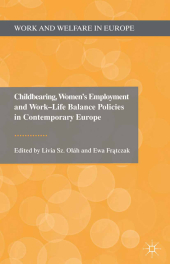 Neuerscheinungen 2013Stand: 2020-01-07 |
Schnellsuche
ISBN/Stichwort/Autor
|
Herderstraße 10
10625 Berlin
Tel.: 030 315 714 16
Fax 030 315 714 14
info@buchspektrum.de |

Ewa Fratczak, Livia Sz. Oláh
(Beteiligte)
Childbearing, Women´s Employment and Work-Life Balance Policies in Contemporary Europe
Herausgegeben von Oláh, Livia Sz.; Fratczak, Ewa
1st ed. 2013. 2013. xvi, 224 S. 216 mm
Verlag/Jahr: SPRINGER PALGRAVE MACMILLAN; PALGRAVE MACMILLAN UK 2013
ISBN: 1-349-34027-8 (1349340278)
Neue ISBN: 978-1-349-34027-9 (9781349340279)
Preis und Lieferzeit: Bitte klicken
This volume addresses the relationship between childbearing, paid work and work-life balance policies across Europe in the 21st century, illuminating the uncertainty and risk related to insecure labour force attachment, the incoherence of women´s and men´s access to education and employment and the unequal share of domestic responsibilities.
1. Introduction: Aspirations and Uncertainties: Childbearing Choices and Work-Life Realities in Europe; Livia Sz. Oláh and Susanne Fahlén 2. Work and Childbearing Intentions in a Capability Perspective: Young Adult Women in Sweden; Susanne Fahlén and Livia Sz. Oláh 3. Employment Instability and Childbearing Plans in a Child-Oriented Country: Evidence from France; Ariane Pailhé and Anne Solaz 4. Female Employment, Reconciliation Policies, and Childbearing Intentions in East and West Germany; Katharina Lutz, Mandy Boehnke, Johannes Huinink and Silke Tophoven 5. The Interplay of Fertility Intentions, Female Employment and Work-Life Balance Policies in Contemporary Poland: Can Gender Equity, Preference, and Social Capital Theories Provide a Better Insight?; Ewa Fratczak & Aneta Ptak-Chmielewska 6. Unattainable Desires? Childbearing Capabilities in Early 21st Century Hungary; Judit Takács 7. Concluding Thoughts on Childbearing, Women´s Work and Work-Life Balance Policy Nexus in Europe in the Dawn of 21st Century; Livia Sz. Oláh and Susanne Fahlén
"The volume extends our knowledge about the mechanisms of childbearing decision making, the effect of increased labour market flexibility on family choices, the impact of policy measures, and the interplay between micro- and macro-level factors in different social contexts. The careful selection and the relatively low number of countries make the cross-national comparisons interesting and manageable, providing a good balance between detailed single-country descriptions and more generalised overview of dozens of nations. Even though each empirical chapter deals with one country at a time, the common comparative conceptual framework and the harmonised research design are meant to contribute to the coherence of the book. Moreover, the introductory and closing chapters seek to provide a common background and synthesise the findings." - Lívia Murinkó, Demographic Research Institute, Budapest, Hungary
Susanne Fahlén, Stockholm University, Sweden Ariane Pailhé, French National Demographic Institute, France Anne Solaz, French National Demographic Research Institute, France Katharina Lutz, University of Frankfurt, Germany Mandy Boehnke, University of Bremen, Germany Johannes Huinink, University of Bremen, Germany Silke Tophoven, Institute for Employment Research, UK Aneta Ptak-Chmielewska, Warsaw School of Economics, Poland Judit Takács, Hungarian Academy of Sciences, Hungary


